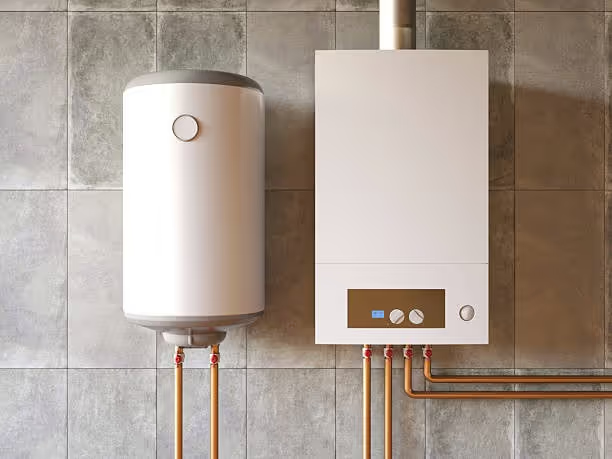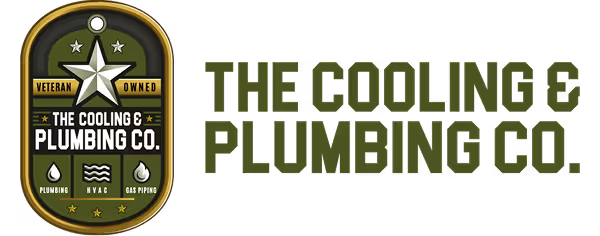Expert Water Heater Replacement in Queen Creek, AZ
Waking up to a cold shower or discovering a puddle around your water heater is a stressful experience no homeowner wants. Reliable hot water is essential for daily comfort and sanitation, from washing dishes to bathing. When your water heater begins to fail, it disrupts your entire routine and can even pose a risk of significant water damage to your home. Securing a professional and timely replacement is not just a matter of convenience—it's a crucial step in protecting your property and restoring normalcy to your household.
As Queen Creek's trusted plumbing and cooling experts, we understand the urgency and importance of a functioning water heater. Our certified technicians specialize in seamless, safe, and efficient water heater replacement services, ensuring your home is equipped with a reliable and energy-efficient system tailored to your specific needs.

Telltale Signs Your Water Heater Needs Replacement
It's not always a catastrophic failure that signals the end of your water heater's life. Often, there are subtle warnings that, if noticed early, can help you plan for a replacement before you're left without hot water. Be on the lookout for these common indicators:
- Age: A conventional tank-style water heater has an average lifespan of 8 to 12 years. If your unit is approaching or has surpassed this age, it's operating on borrowed time.
- Inconsistent Hot Water: If your hot water runs out much faster than it used to or if the temperature fluctuates wildly, the internal components are likely failing.
- Rusty or Discolored Water: Brownish or rust-colored water coming from your hot water taps is a clear sign that the inside of your tank is corroding. This corrosion can eventually lead to a tank rupture.
- Strange Noises: Popping, rumbling, or banging sounds from the tank are often caused by sediment buildup that has hardened. This forces the unit to work harder, reducing efficiency and leading to damage.
- Visible Leaks or Moisture: Any amount of water pooling around the base of your water heater is a serious warning sign. While a leak could be from a fitting, it often indicates a crack or breach in the internal tank itself.
- Rising Energy Bills: An older, inefficient water heater has to work much harder to heat the same amount of water, leading to a noticeable increase in your utility costs.
Choosing the Right Water Heater for Your Home
The technology behind water heaters has advanced significantly, offering more choices than ever before. Selecting the right model depends on your family's size, hot water usage habits, budget, and energy efficiency goals. Our experts can help you navigate the options.
Traditional Storage Tank Water HeatersThese are the most common type of water heater, storing and pre-heating a set amount of water in a large, insulated tank.
- Pros: Lower initial purchase and installation cost, proven technology, and simple operation.
- Cons: Can run out of hot water if demand is high, suffers from standby heat loss (losing energy even when not in use), and has a larger physical footprint.
Tankless Water Heaters (On-Demand)Tankless models heat water directly as you need it, without the use of a storage tank. When a hot water tap is turned on, cold water travels through a pipe into the unit, where a gas burner or electric element heats it instantly.
- Pros: Provides an endless supply of hot water, significantly more energy-efficient (saving money on utility bills), has a much longer lifespan (20+ years), and is compact in size.
- Cons: Higher upfront cost for the unit and installation, and may require upgrades to your home's electrical or gas lines.
Heat Pump (Hybrid) Water HeatersThese units combine a traditional storage tank with a heat pump that captures warmth from the surrounding air and transfers it to the water inside the tank.
- Pros: Exceptionally energy-efficient, often resulting in the lowest annual operating costs.
- Cons: Higher initial cost, requires more space for installation due to airflow needs, and works less efficiently in very cold spaces.
Our Seamless Water Heater Replacement Process
We have refined our replacement process to be as smooth and non-disruptive as possible, ensuring you have a positive experience from start to finish.
- On-Site Assessment: A certified technician will visit your Queen Creek home to inspect your current system, assess your plumbing and energy connections, and discuss your household's hot water needs.
- Expert Recommendations & Upfront Pricing: Based on the assessment, we will present you with clear, suitable options for your new water heater. You will receive a detailed, transparent quote with no hidden fees, so you can make an informed decision.
- Safe Removal & Responsible Disposal: Our team will carefully drain and disconnect your old water heater. We handle the heavy lifting and ensure the old unit is removed from your property and disposed of in an environmentally responsible manner.
- Precision Installation: Your new water heater will be professionally installed according to all local Queen Creek building codes and manufacturer specifications. We ensure all plumbing, gas, or electrical connections are secure and safe.
- System Testing & Final Walkthrough: Once the installation is complete, we thoroughly test the new unit to confirm it is operating correctly and efficiently. We will then walk you through its features and any maintenance recommendations to ensure you are comfortable with your new system.
Frequently Asked Questions About Water Heater Replacement
How long does a water heater typically last in Arizona?
Given Arizona's hard water, the lifespan can sometimes be shorter than the national average. Without regular maintenance like flushing sediment, a tank water heater may last 8-10 years.
Is it better to repair or replace my water heater?
This depends on the age of the unit and the cost of the repair. If your water heater is over 8 years old and requires a major repair, replacement is often the more cost-effective long-term solution. A leaking tank always necessitates a full replacement.
Do I need a permit to replace my water heater in Queen Creek?
In many cases, a permit is required for water heater replacement to ensure the installation is performed safely and meets local building codes. We handle all necessary permitting as part of our comprehensive service.
How long does the replacement process take?
A standard replacement of a similar-type water heater typically takes a few hours. If you are switching from a tank to a tankless model or if plumbing modifications are needed, the process may take longer. Our technicians will provide a clear timeline before work begins.






